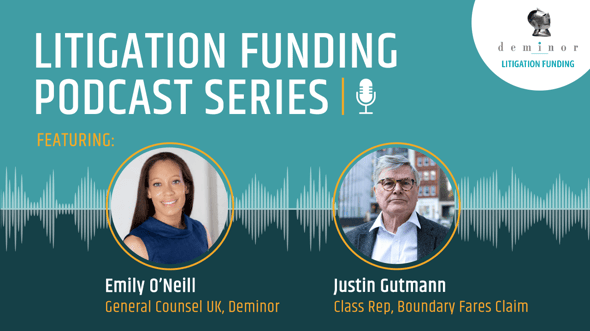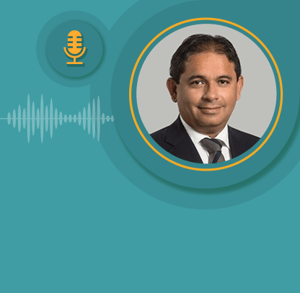In this podcast series, Emily O'Neill General Counsel UK for Deminor Litigation Funding, undertakes interviews with global professionals to discuss different aspects of the litigation funding process. We have already considered the importance of the client in litigation funding as well as the business case for funding.
Deminor welcomes you to join this conversation as we summarise the key elements of the conversations between Emily O'Neill and these experts, as captured in the podcast transcripts below.
Podcast Preface:
Deminor General Counsel UK, Emily O'Neill (EON), speaks with Justin Gutmann (JG), Class Representative in the Boundary Fares claim and the Proposed Class Representative in the Apple batteries claim filed in the Competition Appeal Tribunal (CAT).
In this interview with Emily, Justin gives a fascinating insight into the role and mechanics of being a class representative and discusses whether the collective action regime is providing a working mechanism for consumer redress.
Podcast Transcript:
EON – What motivated you to become a class rep?
JG – Well, primarily because I'm passionate about consumer rights and wrongs. Whilst I accept that markets fail, I also accept that they do lots of wonderful things; they deliver an extraordinary variety of goods and services that make our lives what they are today, but sometimes they do fail. And, when markets fail, consumers need redress, and they need redress mechanisms – either informally or formally, either under the law or some other mechanism. When things go wrong, we need to find ways of putting them right, and I'm passionate about that process.
Nowadays, regulation designed to help markets that might fail is very light touch and doesn't always work effectively in the interests of the consumer. The 2015 Consumer Rights Act has presented a golden opportunity to fix things when everything else has failed, and that's why I'm involved in this regime and why I'm involved in these cases because I'm passionate about consumer redress. This is a mechanism for when we're in the end game, that I can actually do something about it, I can act effectively. So, when I was asked to get involved with the Boundary Fares case, where I already knew about the problems, I leapt at the chance, so that's how I came to be where I am now.
EON – What is your role as a class rep, and how do you ensure you're fulfilling that role effectively?
JG – That's a very good question. Who knows what the role of the class rep is? There are no real rules laid down. It's a very open thing under this new regime, which has only been going for eight years, but there are now a considerable number of cases and a considerable number of class reps or proposed class reps.
I was one of the first, along with Walter Merricks, and we've had to make it up as we go along. I've been led by Walter in many ways – he founded the class reps Network, which is an important gathering of class reps who exchange notes, compare activities and consider each other's roles. And that's been very helpful, but having said that, I've had to make it up for myself as I've gone along, so there's no set of rules laid down about the role. I've had to learn a great deal about consumer law, competition law, as well as court procedure. I've had to learn to fulfil whatever role it might be so that I can find my way through the tangle of information. That has been intellectually stimulating, but that's not really what it's all about.
Aside from the law, I have to lead a diverse team of people – it's a bit like herding cats. In the Boundary Fares case, I have co-counselling with Hausfeld and Charles Linden. They're both marvellous organisations, of course, but they have their differences, and my role is to smooth over those differences and make sure that we act together as a team. I have a funder who sometimes likes to interfere, as funders do, sometimes reasonably and sometimes not so reasonably. I also have economists, technical experts, and barristers. All those people together are supposed to be a team, but of course, they're not really a team. They're kind of pretending to be a team because they all have their independent roles and behind those roles, their own interests in the case and in their commercial operations. I don't have a commercial interest at all, but I do have an interest in my class and winning the case. So, a key aspect of what I do is trying to make all that work efficiently and to keep them all on the same focus of winning the case for the class, or at least finding a settlement for the class.
I also have to be a financial manager because there is a great deal of money involved day to day. I don't just mean in terms of seeking damages, I mean day-to-day expenditure, solicitors’ fees, experts’ fees, and barristers’ fees, and that goes up and down. Part of my role is to sign off the litigation funding monthly reports. I have to look very carefully at what the money has been spent on and make sure that it is appropriate and that it's not getting out of hand. So that not only is the funder happy, but ultimately, the CAT (Competition Appeal Tribunal) will be happy – that's a big part of my role.
Sometimes, I have to actually force my advisors to think carefully about what they are advising me to do by asking naïve but difficult questions. They will come to me for a decision. Then they'll say, “This is what we recommend,” and I will say, “Well, you need to explain that a little bit more fully because I don't understand it, and if I don't understand it, then it's not going to happen.” So, getting them to be explicit, which sometimes means that things change because I force them into a corner and I say, “Oh, so you mean this, do you?”, [And they will say] “Oh, no, we don't actually mean that. We mean something else.” That's how I carry out my role.
How I ensure I'm doing it effectively, I suppose, ultimately will be how the case goes, to be perfectly frank. I rely on all my advisors to do their different roles, and I try to get them to do the roles effectively and to work with one another to make sure that they don't duplicate and that they're efficient, cost-efficient, and so on, and that their advice is good for me, and I understand it – that's the best I can do.
EON – What about the regime as a whole? It’s a new regime, nothing's has gone all the way through yet. What is your impression of the class rep regime in the UK from your experience?
JG – I'm pleased that the regime is here, without it, when regulation fails, things would just come to a stop. This is a new mechanism, and it's one that I welcome. I was at Citizens Advice when the law was passed in 2015 and had a small role in the consultative process that took place. So, I was well aware of it and well aware that it was a backstop, but it's a good backstop. It's evolving, and it's consolidating as we go along, so it’s not yet fully formed eight years later.
The certification process, which is the process underpinning the act, has been tested most fully so far, because we have no settlements and we have no court cases, no trials. That’s been developed and refined. The Supreme Court and the Court of Appeal have helped considerably in clarifying the law in relation to the certification process, and that has been wholly beneficial. They've made things much clearer so that the certification process functions effectively to stop cases without merit from going forward, which is the purpose of the certification process. Whilst at the same time not placing unnecessary barriers in the way of those cases which are meritorious. That’s a difficult balancing act because we don't want to erect such barriers that are costly and reject cases that basically do have merit, whilst at the same time, we don't want to have floods of litigation which have no merit at all. That's the danger that was foreseen.
From my perspective, whilst sometimes personally in my cases, it can be very frustrating; ‘you need to do this, you need to do that, you've got to have more research, your research isn't clear, why are you doing this?’ All these difficult questions that the CAT quite rightly asks in the interests of justice and efficient law can be a real pain for the litigant.
That's on the one hand, on the other hand, as a mechanism for consumer redress, it's cumbersome, it's expensive, it's lengthy and time-consuming. It's a patch-and-mend solution to a much bigger problem: the failure of the consumer redress mechanisms for market failure in this country – and to be honest, throughout the West. But certainly, in the UK because primarily the poor infrastructure for consumer redress at an earlier stage - trading standards has been virtually wiped out, regulation is a light touch, with poor, very narrowly defined economic regulation rather than looking at the whole area of consumer purchasing and choice.
To have a mechanism at the end of all of that, to try and fix it, that is cumbersome, time-consuming, lengthy and expensive, is not ideal. So, there we are, that's how it is. I'm sure that JFK would be turning in his grave if he had known this when he started this process 60 years ago by making his statement to Congress about the need for good consumer redress so that consumers can make good choices, knowing that when those choices go wrong, things can be put right quickly, effectively, to help markets work better for everybody, but for the society as a whole, and for consumers in particular.
It was JFK that started the whole consumer movement in the Western world, and we still look back to that statement, which was then expanded by the UN, and which has informed law and institutions in the UK, and is informing still what we're trying to do with the Consumer Rights Act 2015. So, I'm sure he would not be happy if he were still alive to see this cumbersome, elaborate apparatus which, nevertheless, we're stuck with, and I'm involved with. When I complain, as I am doing about this regime, it's what I have to work with… we have to work with poor clay sometimes, that's life.
EON – Thanks I think it's useful to have the feedback from users of the system and it's still relatively young and hopefully the feedback will help to improve the system going forward, even though the broader market there are issues, but at least we have something now.
The next question came out of a talk that you gave at the Law Society Disputes Conference where you were talking about the role of funders in class actions, and you said ‘funders are a necessary evil’.
How do you work with funders? What your thoughts around how funders work and how they are interacting with the system?
JG – I didn't mean it to be offensive, especially as I'm sitting here with a funder. What I meant was that we'd like to get on with the law and get on with the litigation. But of course, as I've already said, it's an expensive, cumbersome business, and so we are obliged, to have funding. The mechanism that has very quickly evolved is that funders have leapt into this marketplace, thankfully. We've developed common ways of working with litigation funding agreements, and the ones I've seen and the ones I've heard about seem to be both innovative in the sense of providing a mechanism for funds right from the word go.
We've had a few ups and downs – Walter Merricks had a funder who jumped ship, which is well known in the public domain, and he had to find further funders. I'm not going to comment on that, but that was part of the development of the funding regime.
I'm involved with three funders. They're all very different in personality and approach, but they all have common elements, and of course, they are responsible to their investors, whoever they may be, and they're providing capital from capital markets. And I understand that, and why money needs to be made – they're not in it out of altruism or charity for charitable purposes. Although I have to say with a little bit of cynicism that many funders in the public domain, particularly on LinkedIn, like to claim how they are bringing justice for the underdog and looking after the little person. Fine. That's marketing. I've been in marketing. I understand all that, but it has nothing to do really with litigation funding agreements, which are clear commercial arrangements for this party with funds, to fund this party who doesn't have funds, and for them to make a return on their capital. What's wrong with that? That's what consumer society is all about.
In terms of my role and at the initial stages, I have to say it's the solicitors who make the running with funders, not class representatives or certainly not this class representative. And as far as I know from other class reps, I'm pretty much the same as everyone else. So, going to market, it's solicitors who go to market, and rightly so. The reason it's right is because it's solicitors that have the knowledge of the market. It's solicitors that understand the case at the early stages, where it's going, how it's going, and what it's likely to cost.
The class rep needs to know the law. This isn’t a problem ifthe class rep happens to be a lawyer, and some of them are – I'm not; I'm a consumer campaigner and a market research designer. I knew initially little about the law, and I certainly knew nothing about the funding of the law. So, it's solicitors who make the running, but of course, they have to convince me that what they're doing is right. But I can put my hand up and share my thoughts. I've never had the last word on the selection of a particular funder – that's always been my advisors who've done that.
Once that selection has been made, I meet with the funders, we talk together, we talk about strategy, we talk about costs along with my other advisors, and we learn, and I learn how to negotiate with them. Because sometimes, of course, the commercial requirements of the funder may be slightly at odds with the requirements of the class as I perceive them, or the requirements of the solicitors and their funding agreements with me, or the barristers and their CFAs. There is plenty of scope for disagreement, and part of my role, as I said earlier, is to try and smooth those things over, to help mediate.
Once things are underway, my job is to keep the funder informed and happy and to reassure them that their funds are being spent wisely and appropriately and at the right time, because there is a lot of money involved. Sometimes, I'll sign a monthly litigation funding note for half a million pounds, and that's a lot of analysis to look through and make sure – Are these meetings really necessary? Do we need to have team meetings twice a week or whatever it is? I'm just using that as an example, but it could be anything. It could be some specialist, expert advice that seems to be racking up costs. And do we need to pull that back a bit? Do we need to manage it more effectively? Spread it over a longer period? I'm not the financial manager, but I have a financial management role, and that's right because I'm acting in the interests of the class.
I will say this: the development of the regime over the last eight years, really over the last five years or six years, when it's got going, does show that the funding system is working in the sense that capital is flowing towards the regime and there is no shortage of capital for well thought out cases. It's clear to funders that the certification stage is working effectively to make sure, even though they've checked with their barristers and their risk managers, that the risk is appropriate for them to take, and that the rewards are going to be acceptable. They know that the certification process is going to ensure that once they're over that hurdle, then it's worth the long-term investment. So, I'm very pleased about that.
I will just finish by saying that what I see as the temporary problem of the PACCAR judgement is, in my view just a blip that will soon be sorted out. I don't know what your particular firm's view of that is, and there have been differences with my funders about how to deal with it in modifying the litigation funding agreements, and we're kind of resolving that as we go along.
I won't pretend that it's been easy, it hasn't. Funders, bless them, have taken the opportunity to not only deal with those clauses in the LFAs that are directly related to the PACCAR issue but to tighten up and enhance their commercial standing in a new litigation agreement. Which, to put it crudely, is now being forced through on the basis of the PACCAR agreement. And, of course, we're pushing back on that, and we push back and forwards, and negotiations take place, and I'm confident that they will be resolved to everybody's satisfaction.
EON – I'll just respond to a couple of the points if I may!
EON – On PACCAR for us, we're not funding any of the collective actions in the UK, and I think for us, the impact has been less severe. We're mainly funding individual cases so it's much easier to look at those cases and for the client in those cases to have visibility over what their return and the spend will be if there is no percentage and it's a multiple basis for the return. So, I think we've had less head-scratching than some of the funders who are active in the CAT.
I think on the role of funding and how we see our industry, there's lots of different ways to make money, and it's the types of cases that you decide to invest in that is important. There are a lot of cases out there that are likely to be successful, but I think from our standpoint, we've come into the market in a slightly different way to some of the other funders in that we started off advising minority shareholders and then moved into supporting them to recover their investment losses. A lot of our founders who are still involved in the decision-making, their thought process is, what is the right type of case for us to invest in? Not only is it going to be successful and economically viable, but also, is it the right type of case?
So yes, we are an investment business. Yes, we are investing money, but we can decide how we invest that money, and I think we do that in our investment committee. But it is a business, and it's not a charity, and we need to make a return. I think everybody understands the environment, the business, the industry and mostly, we're trying to go the same way as the client and where our interests are aligned are the cases that we really like to fund.
JG – I didn't mean to imply in my comments that you or any other funder really had no values at all. As you rightly say, and which I didn't mention, is that, of course, whilst funders are primarily commercially orientated looking for a return on capital and rightly so, nevertheless, in choosing which cases to fund, which is, I think, your point – they can make some value judgments about what does our firm stand for in this? When we're choosing where to fund, should we fund this case with merit? Or that case with merit?

Litigation Funding Podcast Series - Next Steps and Further Information:
Thanks for joining Deminor's Litigation Funding Podcast Series as we dive deep into core topics in funding litigation.
Keep a lookout for our upcoming conversations as Deminor General Counsel UK, Emily O'Neill, speaks with several more experts to get their insights into different aspects of litigation funding.
If you would like to connect with either Emily or Justin on LinkedIn, please click on the links below:
Emily O'Neill – Deminor General Counsel UK and Global IP lead
Justin Gutmann – Class Representative in the Boundary Fares claim and Proposed Class Representative in the Apple batteries claim
***
Further Reading:
- https://www.deminor.com/en/case-studies/co-funder-proposes-sharing-of-litigation-funding-risk-to-leverage-deminors-in-house-due-diligence-capability
- https://www.deminor.com/en/case-studies/financing-assertion-of-patents-protecting-manufacturing-processes
- https://www.deminor.com/en/case-studies/telecoms-patent-assertion-multi-jurisdictional-campaigns
- https://www.deminor.com/en/case-studies/canadian-innovative-start-up-preparing-for-a-david-v-goliath-litigation-funding-battle
- https://www.deminor.com/en/case-studies/whats-the-risk-assessing-the-risk-of-counter-assertion-by-the-defendant-in-patent-litigation
- https://www.deminor.com/en/case-studies/overstepping-the-mark-litigation-funding-trade-mark-infringement
- https://www.deminor.com/en/case-studies/lights-camera-action-recovering-damages-for-infringement-of-rights-in-a-short-film
- https://www.deminor.com/en/case-studies/recovering-damages-for-stolen-software-through-litigation-funding
- https://www.deminor.com/en/case-studies/funding-in-the-pharma-sector-/-investing-in-a-case-where-litigation-is-already-ongoing









